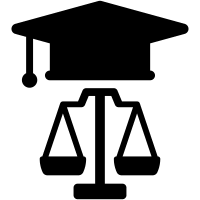
Introduction
The Bachelor of Laws (LLB) is a prestigious academic degree for those aspiring to pursue a legal career. This program covers essential areas such as constitutional law, criminal law, and legal ethics. Through a comprehensive curriculum, students gain the critical skills necessary to navigate the legal system effectively.
Program Structure
- Core subjects include constitutional law, contract law, and tort law.
- Advanced topics such as international law and administrative law are also included.
- The curriculum ensures a comprehensive understanding of legal principles.
- Practical sessions, including moot courts, are integrated into the program.
- Internships provide real-world legal experience.
- Students develop legal writing and research skills throughout the course.
Developing Legal Skills
- Emphasis on critical thinking and analysis.
- Encourages students to engage with case law and legal precedents.
- Skills in constructing coherent legal arguments are fostered.
- Involves practical components for hands-on experience.
- Focus on advocacy and negotiation skills.
- Students learn to assess and resolve complex legal issues.
Ethical Considerations
- Students study professional conduct and legal ethics.
- Emphasis on the importance of integrity in the legal profession.
- Discusses ethical dilemmas encountered in legal practice.
- Students learn about the responsibilities of legal practitioners.
- Commitment to access to justice is a key focus.
- Ethical grounding prepares students for real-world challenges.
Duration and Opportunities
- The typical duration is three to four years.
- Programs may be offered full-time or part-time.
- Accelerated options are available for qualified students.
- Graduates must meet licensing requirements to practice law.
- Career paths include roles in various sectors beyond traditional law.
- Continued education opportunities enhance career prospects.
Career Paths
- Graduates can work in government, non-profits, and private sectors.
- Possible roles include legal consultants and compliance officers.
- Academia and research positions are available for LLB holders.
- Career options in international relations are also prevalent.
- Some may choose to start their own legal practices.
- Graduates often engage in advocacy and policy-making.
Personal Growth
- The LLB program fosters resilience and adaptability.
- Promotes lifelong learning and intellectual curiosity.
- Students develop a deeper understanding of societal structures.
- Enhances skills in public speaking and presentation.
- Networking opportunities help in building professional relationships.
- Encourages critical engagement with current legal issues.
Conclusion
In conclusion, the Bachelor of Laws (LLB) is a transformative educational journey. It equips individuals with the necessary skills, ethical foundation, and practical experience to excel as legal professionals and contribute positively to society. Graduates emerge prepared to navigate the complexities of the legal landscape effectively.